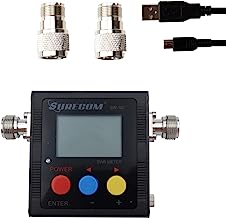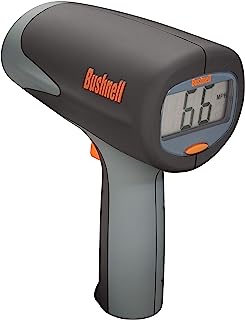When considering buying power meters for VHF radios, it’s important to think about certain key factors to make sure they work well. These factors are important for how well VHF radios can communicate, so it’s crucial to make smart choices if you want to improve your communication. By looking at things like how accurate, compatible, durable, and easy to use a power meter is, buyers can confidently choose one that meets their needs.
See our guide to the best power meters for vhfs.
Accuracy
When it comes to buying power meters for VHF radios, accuracy is crucial. These devices need to be reliable and precise to ensure smooth communication, especially in emergencies. Investing in high-quality power meters that are proven to be accurate can make a big difference in whether your message gets through or not. VHF frequencies are used in many important services like public safety, aviation, marine, and amateur radio. If the accuracy of your power meters is compromised, it could put vital communication and safety at risk.
When it comes to VHF communication, there is no room for mistakes. It is essential to focus on accuracy when choosing power meters, as even a small error can cause serious problems. Making sure that your power meters are calibrated and checked for precision will not only improve the effectiveness of your communication systems but also give you confidence in their reliability. In a world where staying connected is crucial, the accuracy of power meters for VHF radios should never be overlooked or underestimated.
Frequency range
When you’re shopping for power meters for VHF frequencies, it’s important to pay attention to the frequency range the device can handle. Choosing a power meter with a wide frequency range gives you the flexibility to work on various VHF projects. With a broader frequency range, you can easily measure power levels across different bands, which is helpful as radio frequency needs change.
Investing in a power meter with a wide frequency range not only ensures accurate power measurements across different VHF frequencies but also future-proofs your equipment. This is especially useful in situations where frequency use changes often or where testing and maintenance cover a range of frequencies. By choosing a power meter with a large frequency range, you show that you care about quality and performance, making it a smart choice for professionals and hobbyists in the VHF world.
Power measurement range
When buying a power meter for VHF radios, it’s important to get one that can measure power across a wide range. This ensures that your radio communication stays reliable in different situations. A power meter with a broad range not only helps you see how well your transmitter is working, but also lets you monitor power at different levels, improving your VHF setup overall.
Having a wide power range helps you adjust your radio system for better performance at different power levels. This improves your communication quality and gives you more control over your VHF equipment. It’s not just about numbers on a screen; it’s about giving yourself the ability to manage power effectively, so your VHF operations run at their best. In the world of VHF communications, a strong power meter with a wide range can make the difference between successful transmissions and communication problems.
Calibration options
When you’re looking to buy power meters for VHF use, the calibration choices are key in making sure your measurements are accurate and reliable. Choosing power meters with a variety of calibration options can improve the precision and consistency of your measurements, making your VHF system work better overall. By getting power meters with advanced calibration features, users can adjust their measurements to meet specific needs, even in tough VHF environments where getting precise power readings is crucial for the system to work well.
Thinking about the calibration options available when picking power meters for VHF use can make a big difference in how cost-effective and efficient they are in the long run. Power meters with good self-calibration features can make the calibration process easier, cutting down on downtime and labor costs from manual calibration methods. This not only makes maintenance simpler, but also ensures that your VHF system runs at its best for a long time, giving you confidence and reliability in important communication situations. In short, giving importance to calibration choices when buying power meters for VHF use can lead to more accurate measurements, better performance, and a more cost-effective operation overall.
Connectivity options
Choosing the right power meter for VHF radios is important for making sure they work well. Having different ways to connect, like USB, Bluetooth, or Wi-Fi, can make using the radio easier and help manage data better. These connections allow users to check power levels accurately and efficiently, improving the performance of their VHF radios.
Having up-to-date connectivity options not only makes data more accessible but also improves communication between devices, which can lead to better teamwork and sharing information. By picking power meters with various connection capabilities, people can work more flexibly with their VHF radios, leading to new ideas and advancements in radio communication. Overall, the connectivity options in power meters help users use their VHF radios to the fullest in a world where being connected and working together is important.
Conclusion
VHF power meters are important tools for both hobbyists and professionals in the radio frequency field. They offer precision and efficiency in measuring VHF transmissions. By combining advanced technology with easy-to-use interfaces, these meters improve accuracy and user experience. They are changing how we work with VHF frequencies as technology evolves. Power meters are not just for measuring; they also drive innovation and progress in VHF technology. Want more info on language translator device, check the best language translator device.


